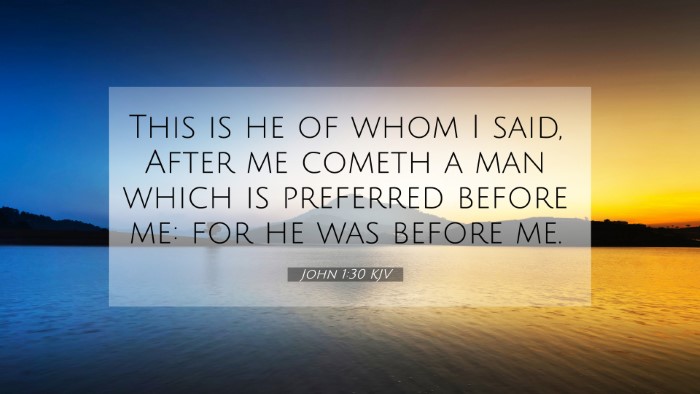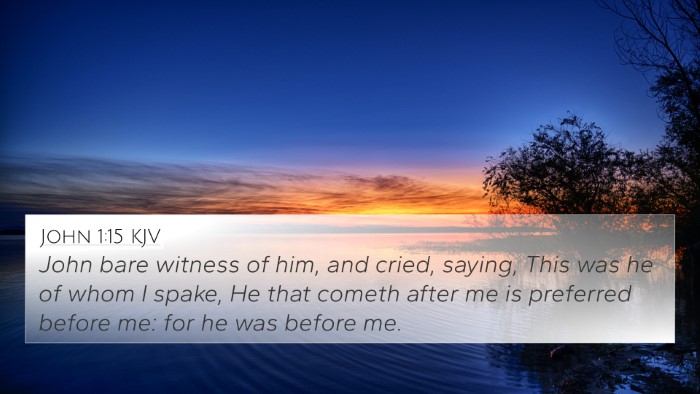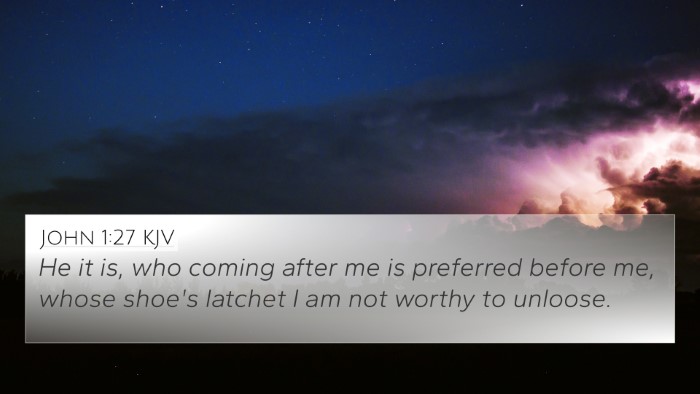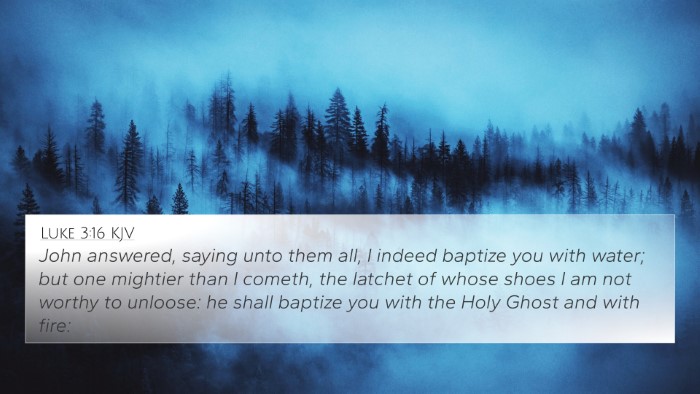Understanding John 1:30
John 1:30 states, “This is he of whom I said, After me cometh a man which is preferred before me: for he was before me.” This verse is rich in theological significance and highlights the preeminence of Christ as the Messiah. Below is a summarized interpretation based on insights from public domain commentaries.
Verse Context and Background
In the context of the Gospel of John, this verse conveys the testimony of John the Baptist regarding Jesus. It underscores the prophetic role of John and delineates the relationship between him and Jesus, highlighting that although John was born before Jesus in the flesh, Jesus, being eternal, existed before John spiritually and divinely.
Commentary Insights
- Matthew Henry:
Henry emphasizes that John the Baptist had a clear understanding of his role in God's plan. He recognized Jesus as the one who comes after him but who holds a higher, preordained place in salvation history. John points to the priority of Christ, signifying His divine nature and eternal existence, which transcends time.
- Albert Barnes:
Barnes notes that this declaration by John the Baptist serves to establish the identity of Jesus as the Messiah. He explains that John articulates not only the order of their ministries but also the inherent greatness of Christ, pointing to His preexistence as a foundation for understanding His mission on earth.
- Adam Clarke:
Clarke elaborates on the manner in which John the Baptist diminishes himself while exalting Christ. He interprets the phrase 'preferred before me' as an acknowledgment of Jesus's supremacy and the celestial origin of His mission as the Lamb of God, alluding to the sacrificial nature of Christ's coming.
Key Themes and Theological Implications
This verse encapsulates several essential themes:
- The Preeminence of Christ: John’s acknowledgment that Jesus is preferred before him highlights Jesus’s superiority and divine identity.
- Fulfillment of Prophecy: John's role as forerunner fulfills Old Testament prophecies, creating a bridge to the New Testament understanding of Christ.
- Divine Nature of Christ: The statement that Jesus was 'before' John reinforces the doctrine of the Trinity and the belief in Jesus's eternal nature.
Bible Verse Cross-References
John 1:30 connects with several other scriptures, offering layers of understanding:
- Isaiah 40:3: "The voice of him that crieth in the wilderness," a prophecy of John’s ministry as a forerunner.
- Malachi 3:1: The promise of a messenger preparing the way for the Lord.
- John 1:1: Establishes the preexistence of Christ as the Word.
- Colossians 1:17: “And he is before all things, and by him all things consist,” emphasizing Christ's eternal existence.
- John 3:30: “He must increase, but I must decrease,” which echoes John the Baptist's understanding of his role.
- Hebrews 1:2: God has spoken in these last days by His Son, affirming Christ’s ultimate authority.
- Matthew 3:11: John's own words about baptizing with water, signifying Jesus’s greater ministry.
Connections Between Bible Verses
John 1:30 can be used as a part of a broader Bible verse cross-reference study to uncover deeper insights:
- Looking at how Jesus is introduced in the Gospels can lead to a comparative Bible verse analysis of their accounts.
- Inter-Biblical dialogue can be explored between the Old and New Testaments regarding Messianic prophecies.
- By studying thematic Bible verse connections, one can draw parallels between John’s proclamations and Jesus’s own statements of His divine mission.
Conclusion
In summary, John 1:30 serves as a critical pivot in understanding the nature of Jesus Christ and the role of John the Baptist. By employing tools for Bible cross-referencing, believers can delve deeper into the scriptural text, pulling together insights that relate to the inherent themes of prophecy, divinity, and the preparation for Christ’s advent.





